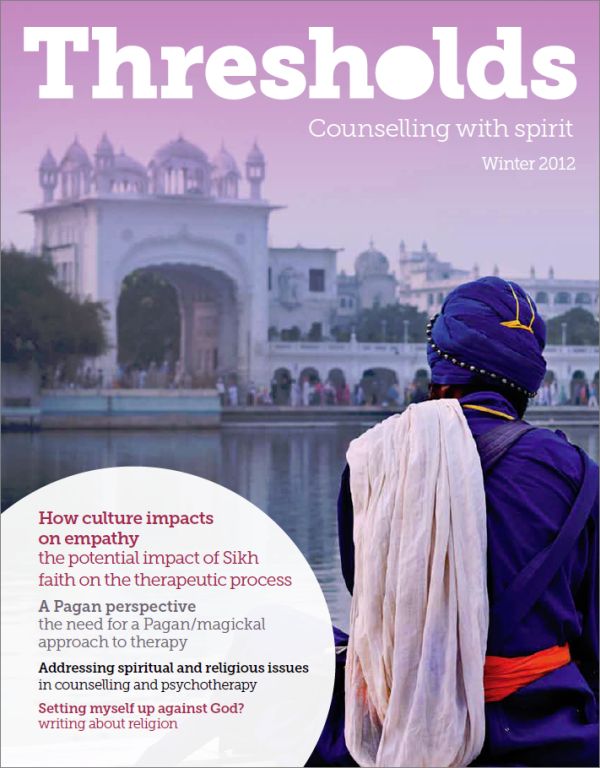In this issue
Features
Research
A Pagan perspective
Estelle Seymour reflects on her research into the need for a Pagan/magickal approach
Perspectives
The messy mysteries of learning to receive
Alison Phipps challenges the taken for granted practices of ‘giving’ and ‘receiving’ in order to equalise relationships and bring about wellbeing for all
Special focus
Addressing spiritual and religious issues in counselling and psychotherapy (free article)
William West considers how counsellors and psychotherapists can hold open a space where clients can explore spiritual issues
People
Setting myself up against God?
Lucy Birtwistle reflects on her personal experience of researching, and writing about, religion
Practice
Culture impacts on empathy (free article)
Jasbinder Singh and Peter Madsen Gubi explore the potential impact of Sikh faith on the therapeutic process
Regulars
From the chair
Lynette Harborne: Opportunities for interaction with APSCC members

All articles from this issue are not yet available online. Divisional members and subscribers can download the pdf from the Thresholds archive.
Welcome from the editor
'The church doors are wide open and my clients are distraught and wanting me to pray with them’ says one my supervisees as she bursts through my study door.
This usually calm woman seems on the brink of tears. This, however, is not a normal time for the quiet market town of Machynlleth, where I live and work. A five-year-old girl has gone missing, and as the days go on, there are fears that she is dead. Someone, a local man, is charged with her murder. Hundreds of people, first volunteers, then professionals, scour the countryside day after day, in the rain. There is the sound of helicopters overhead day and night, roads are closed, police vehicles and land rovers are abandoned on roadside verges, there are press vans and cameras, and people openly sobbing as they tie pink ribbons around the lamp posts. The search turns to the river. The normally empty churches are full of people lighting candles, praying; locals and professional searchers side by side. The community feels like one under siege; mothers rush by, clutching their children’s hands. As the days turn into weeks the press vans disappear, but still they search; a policemen rests his head in his hands, exhausted; the market is strangely quiet; there is silent desperation on the streets.
It seems that there is something about a crisis of this magnitude that leads most of us to look beyond what is happening in the here and now towards the spiritual. As therapists how can we respond to this need? The churches here in Machynlleth have opened their doors, but what about our counselling and psychotherapy practices? How do we respond to clients who find themselves traumatised and deeply distressed by life events going on in their community and seeking spiritual support within their therapeutic sessions? My supervisee has no formal sense of religious affiliation but was able, to use her words, to ‘find a sacred space where we could rest together’.
William West addresses these issues within his article and, as I read, his words confirm that, as a supervisor, I need to continue to find ways of enabling counsellors to connect with their own, and their clients’, spirituality. Alison Phipps also contributes an article about the messy business of learning to receive; reading this gave me one of those rare ‘eureka’ kind of moments, as I think she challenges all of us who have either pastoral care or counselling practices, to think in a different way about our relationships with those we work with. Most of us who are in the ‘caring’ professions, myself included, are more comfortable with the ‘giving’ to others and much less happy about ‘receiving’. Yet, I wonder if sometimes it is through our own vulnerability, and in receiving, that we engage on a much more equal, real, level with the other person. As stated in one of my all time favourite children’s stories, ‘generally by the time you are real, most of your hair has been loved off, and your eyes drop out and you get loose in the joints and very shabby’1. Perhaps it is in our shabbiness that we can be there for the other people in a way that touches their lives; but then of course there are questions of how we can do this, yet remain within the very necessary ethical boundaries of our work. Any thoughts you have on this subject would be welcome.
Also within this issue you will find articles by Estelle Seymour on her research into Pagan approaches to counselling, Peter Gubi and Jasbinder Singh on the impact of Sikh faith on the therapeutic process, and Lucy Birtwistle, who reflects on her personal experience of researching her relationship with God.
It is such a pleasure to see articles, letters and conference reports coming in from such a wide variety of authors, and I would encourage you to continue to send them in to thresholds.editorial@bacp.co.uk It would be especially good for the Spring and Summer issues of Thresholds to have articles from practitioners about their practice and how they integrate spirituality into their work. I am happy, as always, to assist those who have a good idea, but have not written for publication before, and to provide feedback on drafts for those who are more experienced writers.
Dr Susan Dale
Editor
thresholds.editorial@bacp.co.uk
Reference
1. Williams M. The original velveteen rabbit. London: Mammoth, an imprint of Reed Books; 1922.
